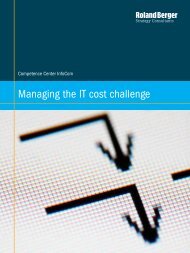issue 1 - Roland Berger
issue 1 - Roland Berger
issue 1 - Roland Berger
Create successful ePaper yourself
Turn your PDF publications into a flip-book with our unique Google optimized e-Paper software.
nearshoring industry report f<br />
However, the South Asian subcontinent is<br />
still the offshore location of choice for all<br />
kinds of services, an enduring consequence<br />
of India’s successful economic run over<br />
the past several years. Of the companies<br />
surveyed in a study titled “Service Offshoring,”<br />
37 percent had awarded outsourcing<br />
projects to India. However, 22 percent of<br />
all projects are commissioned specifically to<br />
Central Europe. The study was conducted<br />
across Europe in spring 2004 by <strong>Roland</strong><br />
<strong>Berger</strong> Strategy Consultants together with<br />
the United Nations Conference on Trade<br />
and Development (UNCTAD). In more than<br />
100 interviews, executive boards and upper<br />
management from a select group of Europe’s<br />
top 500 companies reported on their<br />
challenges and experiences.<br />
Central European companies reap benefits<br />
from the outsourcing of business processes<br />
to countries such as Poland, Hungary, the<br />
Czech Republic or the Baltic states—a procedure<br />
known as “nearshoring.” The Central<br />
Europeans score points with their geographic<br />
proximity, same or nearly same<br />
time zone, similar culture, highly qualified<br />
employees, good infrastructure and EU subsidies.<br />
Plus, their personnel costs are lower.<br />
In a study of wages worldwide, personnel<br />
“SOME PEOPLE COULD HARDLY<br />
BELIEVE THAT VIENNA IS CLOSER TO<br />
KRAKOW THAN TO INNSBRUCK.”<br />
consultants from Watson Wyatt estimated<br />
that programmers in Central Europe earn<br />
up to 75 percent less than their US or<br />
German counterparts. According to the<br />
UNCTAD study, 70 percent lower labor costs<br />
are a driving factor in considering the offshoring<br />
of operations. Hansjoerg Siber, vice<br />
president of Capgemini Systems, an IT<br />
service provider, is one of those who have<br />
established a foothold in Central Europe for<br />
offshoring projects. “Not too long ago, Austrian<br />
business partners, for example, could<br />
hardly believe that Vienna is closer to<br />
Krakow, Poland, than to Innsbruck,” says<br />
Siber. Taking over the BPO center of International<br />
Paper (the world’s largest paper<br />
manufacturer) in Krakow was a smart move<br />
to convince Capgemini customers this is in<br />
fact the case. Alongside this came a multiyear<br />
contract to supply financial and accounting<br />
services to the paper group. Siber<br />
says that after just one year, his IT consultants<br />
have extended their reach and are working<br />
for numerous international companies.<br />
In May 2004, EDS, a Texas-based IT service<br />
giant—and Capgemini rival—that had<br />
already taken its first steps into Central<br />
Europe invested almost $8.5 million in a<br />
new BPO center in the Hungarian capital of<br />
Budapest. The reason was that the 110<br />
think: act 45
















